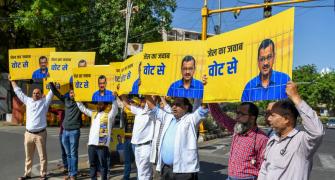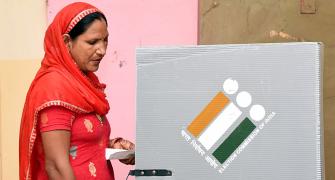Tirupur in Tamil Nadu, the widely-recognised manufacturing hub for textile exporters in India, is struggling to cope with the appreciating rupee. While some apparel exporters in the city are finding it difficult to book fresh orders, others have been cancelling contracts.
During the last financial year, Tirupur exported goods worth Rs 11,000 crore. This year, manufacturers fear they will fall short of the 20 per cent growth target.
"It has become difficult to book fresh orders and offer prices that the buyer wants," said A Sakhtivel, president, Tirupur Exporters' Association.
Exporters in the city were incurring losses to the tune of Rs 2 crore every day as the strengthening of the rupee and growing competition from other currencies had severely affected export realisations, thus slowing down exports, he said.
Contracts negotiated for deliveries during April-August were being cancelled because exporters were facing severe losses, said PD Patodia, chairman, textile committee, Federation of Indian Chambers of Commerce and Industry.
"The Indian rupee has appreciated the maximum (around 8 per cent) compared with other currencies like the Chinese yuan, the Indonesian rupia, the Bangladeshi taka and the Pakistani rupee during March 6 to April 26," he said.
On Friday, the rupee had appreciated to 40.93 to a dollar. Analysts estimate that the currency will regain its earlier rate of Rs 42-43 to a dollar over 6-7 months.
Garment exporters operating on margins of about 7 per cent are among the worst hit. Small and medium exporters will be further hit by the sustained rupee appreciation because they do not hedge their risks.
"The rupee rate of 40-41 to a dollar is detrimental to the industry and in particular, to smaller manufacturers. These companies do not opt for hedging due to lack of awareness. Such volatility in the rates will make hedging more frequent in the industry," said Premal Udani, former president, Clothing Manufacturers' Association of India.
Industry experts point out that manufacturers have no option but to increase prices by 10 per cent. However, hiking prices is not a viable option since other countries are not opting for the same.
"Small and medium enterprises contribute to about 35 per cent of the country's total exports. A more organised approach is required and bankers need to impress upon companies the need for forward cover. Though it will lead to increased expenses, they will be saved from such catastrophic situations," said Yogesh Dixit, head, SME ratings, Crisil.








